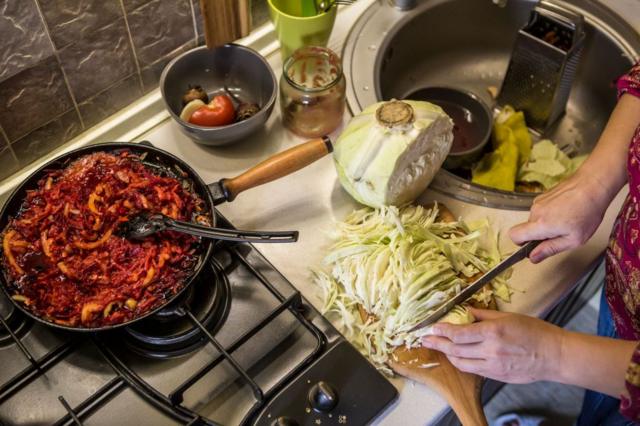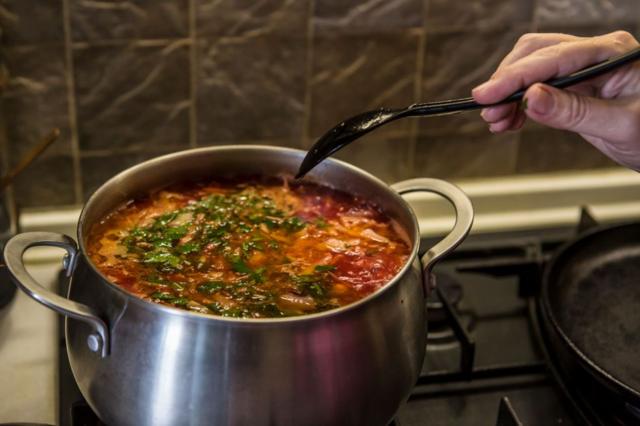Ukrainian chef and restaurateur Yevhen Klopotenko said that he was refused to open a restaurant of Ukrainian cuisine in Japan, citing the fact that in the Japanese perception, borscht is a Russian dish. wrote about this on Facebook.
Ambassador of Ukraine to Japan Serhiy Korsunsky reacted to this statement, who noted that such perceptions in Japan "do not correspond to reality."
But the Japanese journalist and writer Takashi Hirano confirmed in a conversation with the Ukrainian BBC that many Japanese really used to consider borscht to be Russian, but now this situation is rapidly changing.
In his post, Klopotenko posted a screenshot of an e-mail, in which it is said that "in Japan, there is a very widespread opinion that borscht is a Russian dish."
And since the attitude of the Japanese towards Russia is negative, "this does not give the Japanese a good impression of borscht."
At the same time, he did not provide details about who exactly refused him and what offer he made to them.
Klopotenko called it a "great example of Russian propaganda":
"It's clear that people will bypass this place by the tenth road, because the conscious Japanese, fortunately, are historically Russophobes. And now, it's like we're on one side of the barricade, and some fool comes out," he wrote and noted that he wanted to open a "mono-shop with borscht."
He also noted that this situation "only means that we need to work even harder to popularize Ukrainian thought and Ukrainian cuisine in the world."
"Of course, this is an isolated case, because the level of support for Ukraine in Japan is simply incredible," the restaurateur added at the end of his post.
"Not true"
Ambassador of Ukraine to Japan Serhii Korsunsky reacted to Klopotenko's statement.
"No, this is not true. A dozen restaurants of Ukrainian cuisine serving borscht have been opened in Japan for two years," he commented on the news about Klopotenko's rejection on Facebook.
He also noted that the Ukrainian community constantly holds borscht festivals all over Japan, and "the Japanese know very well that borscht is a Ukrainian dish."
"The opinion of one Japanese person who "refused" shows that he or she is simply not competent in the business he is trying to do," the ambassador added.
In the comments to the post, he also said that three books about Ukrainian cuisine in Japanese were published in Japan, and gave several examples of Ukrainian restaurants opened in different cities.
Gastroculture researcher Olena Brychenko also commented on his post.
"In fact, we also received a lot of positive feedback on our book "Ukraine. Food and history", which is sold in Japan, in Japanese, there are as many as 6 different types of borscht, she wrote. - I think the problem lies in the headlines, which always try to hyperbolize."

PHOTO BY GETTY IMAGES
Do not generalize
In a conversation with BBC Ukraine, Takashi Hirano, a Japanese journalist, diplomat and writer who has lived in Ukraine for a long time, advised not to generalize the attitude to borscht based on one case.
"I think that this is the point of view of only one Japanese person, so you should not generalize Mr. Klopotenko. I personally know very well that many Japanese have finally started to know that borscht is a Ukrainian dish," says Hirano.
He adds that he perfectly understands the disappointment of Klopotenko's team regarding this incident.
“I heard this story from a close friend of mine on his team. But as a person who has tried to spread such knowledge in Japan for many years, I have to note that what was said to him is the opinion of only one Japanese person," Hirano insists.
According to him, before the full-scale invasion of Russia, many Japanese were not significantly interested in Ukraine, so many people really believed that borscht was Russian.
"And I fought for a long time for my compatriots to understand that this is not the case, that borscht is a Ukrainian dish, and I tried to prove it in my Japanese-language book about Ukraine, and I wrote about it a thousand times on social networks. Changes took place before the start of the great war, but only gradually. And yet the biggest change came about because the Japanese became massively interested in Ukraine, unfortunately, because of the full-scale invasion," Takashi Hirano told the BBC.
He says that not only him, but quite a lot of people, Japanese and Ukrainians in Japan, are now telling other people that borscht is Ukrainian. And now the changes in the perception of this are definitely noticeable there, insists Hirano.
"Although, of course, it is never possible to say that all people changed their perception at one moment, it is very important to understand the dynamics of such changes for marketing, in particular, in such a specific market as the Japanese market," he said.
And he added that efforts in this direction are still needed, and he himself does it every day.

PHOTO BY GETTY IMAGES
Borscht and politics
The "war for borscht" between Ukraine and Russia has been going on for many years, and after the Russian annexation of Crimea, the war in Donbas and the full-scale invasion of Russia, it has become a particularly sensitive issue for Ukrainians.
In 2022, Russian Foreign Ministry spokeswoman Maria Zakharova accused Ukrainians of "not wanting to share borscht."
"They did not want to compromise. This is xenophobia, Nazism, extremism in all its forms," Zakharova said.
In February 2020, the former advisor to the President of Russia and "curator for Donbass" (he himself denies the latter title) Vladislav Surkov mentioned borscht in his "worldview" interview.
"There is no Ukraine. There is Ukrainian. That is, a specific disorder of the mind, surprisingly brought to the extreme limit of fascination with ethnography. Such bloody local history. Confusion instead of the state. There is borscht, Bandera, Bandura, but there is no nation," Surkov said during an SMS correspondence with a journalist of the "Actual Comments" publication.
And in December of the same year, Russian comedian Andriy Bocharov ("Bocharik") published a post about "Russian borscht."
"After ice skating, Russian borscht goes great," he wrote with the corresponding photo.
Under the post, a real battle broke out over whose borscht it really is - more than 11,000 comments, the discussion lasted for several weeks.
Also in December 2020, the Michelin international restaurant rating published a press release in which it announced that its representatives had arrived in Moscow to evaluate local restaurants and among the "Russian dishes" they mentioned borscht there.
"Shame on you. Ukrainian borsch. How can you relate it to Russian food? This is unprofessional. You don't know what your talking about. Ukrainians are waiting for your statement with apologies," Ukrainian users wrote.
Subsequently, Michelin apologized for the "Russian borscht" and "gastronomic imprudence with unexpectedly political connotations", reported the Ukrainian embassy in France, with which representatives of the gastroguide communicated.
And in 2019, the official account of the Ministry of Foreign Affairs of the Russian Federation published a tweet in which it was stated: "An eternal classic, #borscht is one of the most famous and favorite Russian #dishes and a symbol of national cuisine."
And already in February, "Ukrainian borscht" made it to the top 20 best world soups according to the version of the American CNN Travel.
"And although this soup is sometimes attributed to Russian cuisine, this statement is hotly contested. Ukrainian chefs are now campaigning for their position to be included in the UNESCO World Heritage List," CNN Travel wrote.
In 2021, Ukraine decided to officially defend borscht as its cultural heritage from Russian encroachments and held an event under the auspices of the Ministry of Culture, during which 25 borschts were prepared according to recipes from each of the Ukrainian regions.
This became part of the campaign to submit an application to UNESCO about the "Culture of making Ukrainian borscht".
"Ukrainian borscht defender" Yevgeny Klopotenko, who collected recipes in different regions, was an active participant in the campaign.

